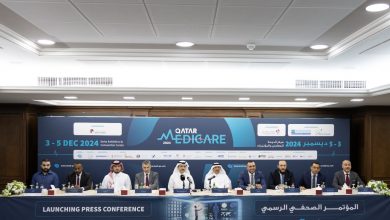HMC Urges Everyone to Know Warning Signs of Dementia
حمد الطبية تؤكد أن التعرف على العلامات التحذيرية للخرف يسهم في العلاج المبكر
QNA
Doha: In support of World Alzheimer’s Month, which is marked annually in September, Alzheimer’s Disease International (ADI), the global federation of over 100 Alzheimer’s and dementia associations across the world, including Hamad Medical Corporation (HMC), are encouraging everyone to Know Dementia, Know Alzheimer’s. The ability to recognize the warning signs of dementia and to seek out information, advice and support can potentially lead to a timely diagnosis and early intervention to help people living with Alzheimer’s disease.
Receiving a diagnosis of dementia can be a challenging and difficult process and varies greatly around the world. In addition, the stigma which still surrounds dementia means that many people avoid seeking a diagnosis until the later stages of the condition. ADI CEO, Paola Barbarino says “Knowing the warning signs and symptoms of dementia enables people to seek out more information, advice and support, potentially leading to a diagnosis. Knowing these signs is even more important now than ever.”
“Forecasts estimate that dementia cases will rise from 55 million to 78 million by 2030, with costs rising to US 2.8 trillion annually. We urge the WHO, governments and research institutions across the globe to prioritize and fund research and to establish resources in this space, to avoid being further overwhelmed by the oncoming pandemic of dementia,” Barbarino added.
Qatar’s National Lead for Healthy Aging and the National Dementia Plan Dr. Hanadi Al Hamad, explained that although awareness of dementia is increasing around the world, knowledge of specific conditions such as Alzheimer’s and other disease that cause demtia, remains low. She has been a strong advocate of promoting public and professional awareness to support patients living with Alzheimer’s, their families, and communities.
“With Qatar’s Public Health Ministry recognizing the notion that Dementia is a public health priority, we were tasked to develop the Qatar National Dementia Plan 2018-2022, designed to improve the lives of persons with dementia and those who care for them and their family members, and reduce the impact of dementia on them, and on society in general. Promoting public awareness about the signs and symptoms of dementia, encouraging the adoption of healthier lifestyle that reduce the risk of dementia, and providing targeted training for different healthcare professionals are key to achieving the National Dementia Plan goals,” Dr. Al Hamad said, who is also the Medical Director of Rumailah Hospital and Qatar Rehabilitation Institute at Hamad Medical Corporation.
“A strategic aim is to work with local and international stakeholders and experts to promote capacity and capability in the field of biomedicine, medical care, public health, applied research on dementia that is centered on the need for innovation, and patient-centered science will help facilitate our understanding of the basic mechanisms that lead to the emergence dementia,” Dr. Al Hamad further added.
Emerging research is showing that the neurological impact of COVID-19 on the brain can increase both a person’s likelihood of developing dementia, and the rate that dementia-related pathological changes develop in the brain. ADI has established a working group of leading dementia researchers to conduct and monitor research into this emergent field. Barbarino comments “We need people to be aware of the possible link between long-COVID and dementia, so they know to self-monitor for symptoms and catch it in its tracks. We are calling on the World Health Organization (WHO) and governments to urgently fast track research into this concerning area”
Barbarino says that knowing the warning signs of dementia and knowing more about the link between COVID-19 and dementia is essential to building a global plan and national responses. Past pandemics have shown the value in knowing the link between novel infectious diseases and progressive neurological disorders.
“It is incredibly important that the public, especially those people at risk of developing dementia, know about the potential impact of long-COVID on their brain health, and measures are put in place to protect them. We need the WHO, governments and research institutions to prioritize and dedicate funds to the research needed to better understand the link between COVID-19 and dementia,” says Barbarino. “Globally healthcare systems are already unprepared for the forecast increases in dementia cases, prior to this new COVID-19 related risk. We need only to look at previous pandemics to see the vital importance of research and preparedness.”
“Dementia is not going away. We need to act now to be prepared for any additional pressure following the COVID-19 pandemic,” Barbarino concluded.
قنا
الدوحة: أكدت مؤسسة حمد الطبية ومنظمة الزهايمر العالمية، أن التعرف على العلامات التحذيرية التي تدل على الإصابة بمرض الخرف، يمكن أن يسهم في تشخيصه في الوقت المناسب وتوفير التدخل العلاجي مبكرا، وذلك بمناسبة الاحتفال بالشهر العالمي للزهايمر الذي يوافق شهر سبتمبر من كل عام.
وفي هذا الإطار، أوضحت الدكتورة هنادي الحمد، قائد أولوية شيخوخة صحية في الاستراتيجية الوطنية للصحة والخطة الوطنية للخرف والمدير الطبي لمستشفى الرميلة ومركز قطر لإعادة التأهيل بمؤسسة حمد الطبية، أنه على الرغم من ازدياد الوعي بمرض الخرف حول العالم، إلا أن الوعي بشأن حالات معينة مثل مرض الزهايمر والأمراض الأخرى التي تسبب الخرف لا يزال منخفضا، داعية إلى دعم الجهود الهادفة لرفع وعي الجمهور وكوادر الرعاية الصحية حول هذا المرض ودعم مرضى الزهايمر وأفراد أسرهم ومجتمعاتهم.
وأضافت: “مع تأكيد وزارة الصحة العامة في دولة قطر على أن مرض الخرف يمثل إحدى أولويات الصحة العامة، فقد تم تكليفنا بوضع خطة قطر الوطنية للخرف /2018-2022/ والتي تم تصميمها بهدف تحسين حياة الأشخاص المصابين به ومن يقوم على رعايتهم وأفراد أسرهم، والحد من الآثار السلبية للمرض عليهم وعلى المجتمع بشكل عام”، مشيرة إلى أن رفع الوعي العام حول علامات وأعراض الخرف، والتشجيع على تبني أنماط الحياة الصحية التي تسهم في الحد من فرص الإصابة به، وتوفير التدريب الموجه لكوادر الرعاية الصحية في هذا المجال، هي عناصر أساسية لتحقيق أهداف الخطة الوطنية للخرف.
وأبرزت أن الهدف الاستراتيجي يتمثل في العمل مع الجهات المعنية على المستويين المحلي والدولي والخبراء في هذا المجال لتعزيز القدرات والإمكانيات المتوفرة في المجالات ذات الصلة بمرض الخرف بما في ذلك الطب الحيوي والرعاية الطبية والصحة العامة والبحوث التطبيقية المرتكزة على الابتكار والممارسات العلمية المتمحورة حول المريض مما يساعد على الوصول لفهم أفضل للآليات الأساسية التي تؤدي لظهور الخرف.
من ناحيتها، قالت السيدة باولا باربارينو، الرئيس التنفيذي لمنظمة الزهايمر العالمية وهي اتحاد عالمي يضم أكثر من 100 جمعية لمرض الزهايمر والخرف، إن معرفة العلامات التحذيرية وأعراض الخرف تتيح للأشخاص البحث عن مزيد من المعلومات وطلب الاستشارة الطبية والدعم المتخصص، وهو ما قد يؤدي إلى التشخيص المبكر للحالة، وأكدت أن معرفة هذه العلامات يعد الآن أكثر أهمية من أي وقت مضى.
ونوهت إلى أن التقديرات تشير إلى أن حالات الإصابة بالخرف حول العالم سترتفع من 55 مليونا إلى 78 مليون حالة بحلول عام 2030، مع ارتفاع التكلفة المادية الناجمة عن هذه الحالات إلى 2.8 ترليون دولار سنويا، داعية منظمة الصحة العالمية والحكومات والمؤسسات البحثية في جميع أنحاء العالم إلى تضمين الأبحاث في هذا المجال ضمن أولويات البحث العلمي لديها.
وقالت بهذا الخصوص: “نحن بحاجة إلى أن يكون الناس على دراية بالارتباط المحتمل بين كورونا /كوفيد ـ 19/ طويل الأمد ومرض الخرف كي يتمكنوا من المراقبة الذاتية لصحتهم للكشف عن أي أعراض بصورة مبكرة، وندعو منظمة الصحة العالمية والحكومات حول العالم إلى دعم وتسريع البحث العلمي في هذا المجال بشكل عاجل”.
وأوضحت أن معرفة العلامات التحذيرية المرتبطة بالإصابة بالخرف ومعرفة المزيد عن الصلة بين /كوفيد-19/ والخرف هو أمر ضروري لوضع خطة عالمية والاستجابة لهذه المشكلة الصحية على المستوى الوطني في كل دولة، مضيفة أن الأوبئة السابقة أظهرت أهمية معرفة الصلة بين الأمراض المعدية المستجدة والاضطرابات العصبية التفاقمية.




